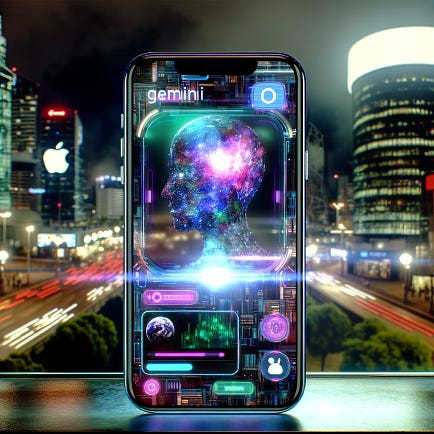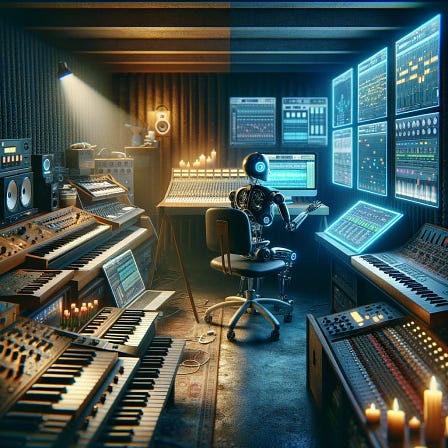Happy Monday Everyone, Apple bought an AI company last week and now we hear about their potential partnership with OpenAI and/or Google Gemini. We also share how music apps are changing music productions quite rapidly and the Red Teams are here to attempt to make models safer. “We want to get to know you better so we can serve you better. Please take 40 seconds to fill the this questionnaire and send us a note quen done to gift you a subscription to this newsletter. Thanks.”
📰 AI News and Trends
🌐 Other Tech news
Apple's AI Dilemma: Can’t go at it alone.Apple Inc. is currently in negotiations with Google to potentially incorporate Google's Gemini artificial intelligence engine into the iPhone's software, aiming to enhance the device's AI features in 2024. This partnership could extend their existing search pact, wherein Google pays Apple as Safari's default search engine. The deal, yet to be finalized in terms of terms or implementation, could significantly impact the AI industry, giving Google's AI model a vast new user base while signaling Apple may need external AI capabilities beyond its ongoing efforts, such as its own AI model, Ajax, and a chatbot dubbed Apple GPT. Despite testing its AI technology, Apple is exploring partnerships due to the superior tools offered by Google and others. This move could also draw regulatory scrutiny, especially considering the current antitrust focus on Google's search deal with Apple. A formal announcement might wait until Apple's Worldwide Developers Conference in June, with possibilities still open for collaboration with other AI providers like OpenAI. 📰 Publications I am currently reading and recommending:
AI vs. Music CraftAs a former music producer, I fondly remember the days spent in the studio, seated before our keyboards and mixing boards, crafting tracks for various music projects. This process involved playing musical phrases, editing, re-editing, and finally mixing and mastering the tracks, sometimes taking a whole day (or several) to perfect a single product. However, the rapid advancement of AI technology in music production brings mixed feelings. On one hand, it democratizes music creation, enabling individuals without formal musical training to share their musical ideas. On the other hand, I'm concerned about the erosion of traditional music craftsmanship. The unique human touch in music could diminish as AI becomes a more cost-effective option for labels and music licensing companies, possibly leading to a quicker decline in the need for human musicians. Suno, a startup pioneering AI in music creation, aims to democratize music production, enabling anyone to craft professional-level songs with simple text prompts. Its latest AI model, developed near Harvard University, impresses even its creators with its ability to generate authentic-sounding music, such as a blues track titled "Soul of the Machine," combining Suno's music generation with OpenAI's ChatGPT for lyrics. Amid rapid advancements in AI across text, images, and video, Suno's founders see their platform as a solution to the disparity between music listeners and creators, envisioning a future where a billion people use Suno to express themselves musically. While the technology fascinates and unsettles, raising concerns about cultural appropriation and the future of human-made music, Suno insists it aims to complement rather than replace artists, potentially impacting areas like ad and TV show music production. Despite its potential to disrupt, Suno focuses on engaging more people with music creation, supporting a vibrant future for artists in an increasingly AI-integrated world. Check this Resources
Red Teaming AI ModelsArtificial intelligence (AI) companies are adopting the practice of "red-teaming" their AI products before launch, a strategy where teams act as adversaries to identify potential weaknesses and vulnerabilities. This approach aims to evaluate AI models for issues like deepfake generation, misinformation, bias, and hateful content. A notable example is OpenAI's text-to-video AI, Sora, which remains unreleased as the firm assesses its risk factors. The challenge lies in preventing AI from generating harmful content, likened to creating a typewriter that refuses to type rude words. This cautionary stance has been reinforced by recent incidents, such as Google's Gemini AI producing inaccurate historical images, heightening industry concerns over AI safety and reliability. 🧰 AI ToolsImage Services Pt. 2
🚀 Showcase Your Innovation in the Premier Tech and AI Newsletter (link) As a vanguard in the realm of technology and artificial intelligence, we pride ourselves in delivering cutting-edge insights, AI tools, and in-depth coverage of emerging technologies to over 55,000+ tech CEOs, managers, programmers, entrepreneurs, and enthusiasts. Our readers represent the brightest minds from industry giants such as Tesla, OpenAI, Samsung, IBM, NVIDIA, and countless others. Explore sponsorship possibilities and elevate your brand's presence in the world of tech and AI. Learn more about partnering with us. You’re a free subscriber to Yaro’s Newsletter. For the full experience, become a paying subscriber. Disclaimer: We do not give financial advice. Everything we share is the result of our research and our opinions. Please do your own research and make conscious decisions. |
Monday, March 18, 2024
🤷 Apple's AI Dilemma: Can’t go at it alone.
Subscribe to:
Post Comments (Atom)




No comments:
Post a Comment